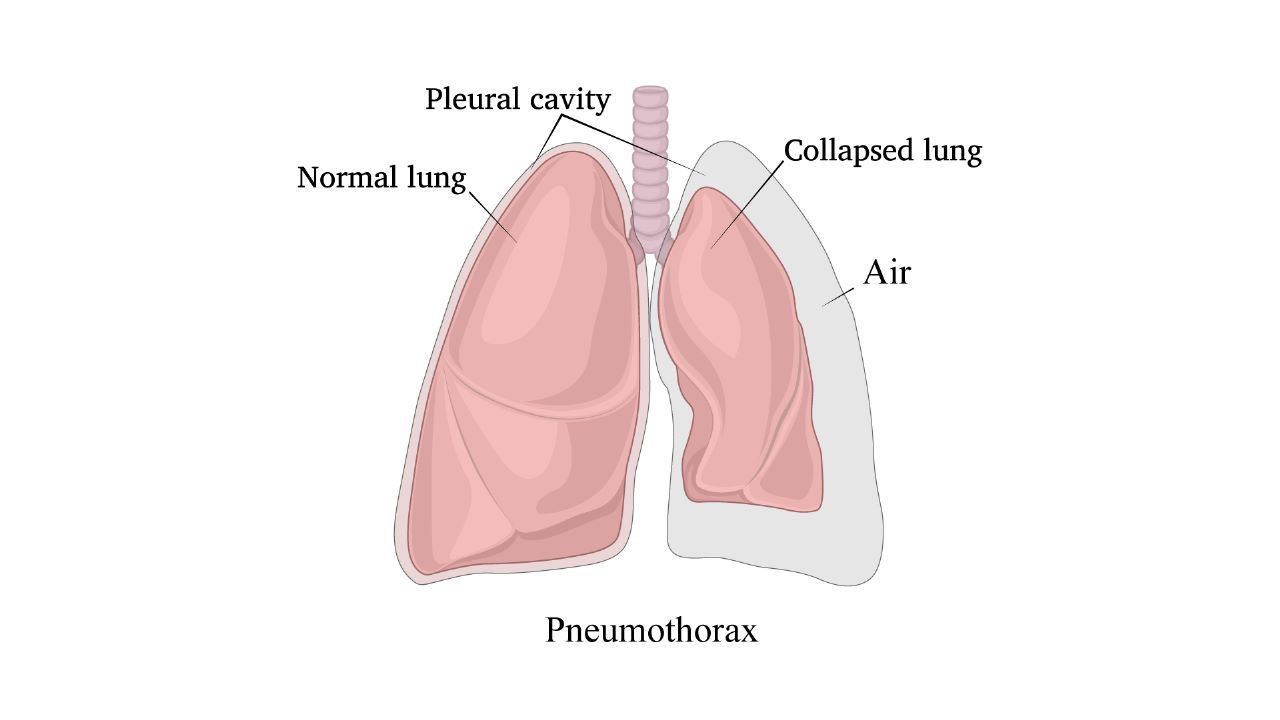
Pneumothorax
A pneumothorax is a collapsed lung due to air accumulating inside the chest cavity. Pneumothorax occurs when air leaks into the space between the lungs and chest wall which pushes on the outside of the lung and makes it collapse. In most cases, only a portion of the lung collapses.
A pneumothorax can be caused by a blunt or penetrating chest injury, certain medical procedures involving the lungs or due to underlying lung disease. Sometimes, pneumothorax occurs for no obvious reason. When the lung collapses, it causes sudden chest pain and shortness of breath.
A small, uncomplicated pneumothorax may quickly heal on its own. When the pneumothorax is larger, doctors usually insert a tube or needle between ribs to remove the excess air.
Symptoms of Pneumothorax
- Sharp, stabbing chest pain that worsens when trying to breath in.
- Shortness of breath.
- Bluish skin caused by a lack of oxygen.
- Fatigue.
- Rapid breathing and heartbeat.
- A dry, hacking cough.
Causes of Pneumothorax
A pneumothorax can be caused by a blunt or penetrating chest injury, certain medical procedures, or damage from underlying lung disease. Or it may occur for no obvious reason. Symptoms usually include sudden chest pain and shortness of breath. On some occasions, a collapsed lung can be a life-threatening event.
How is it treated?
The primary goal of the treatment is to relieve symptoms by removing pressure from the lungs, and allowing it to expand and contract normally. In case of a trauma to the chest, holding a pillow against the chest will help provide relief from chest pain while breathing. The methods to be used depends on the severity of the case and the patient’s overall health
Surgery
Cases where chest tube does not relieve pressure, or pneumothorax has reoccurred, corrective surgery may be required. With the help of a small incision, a tiny fiber optic is inserted. The surgeon with the help of a camera looks for openings and blebs, so as to close them.
Prevention
In order to prevent the occurrence of this disease, one should take care of the following:
- Avoid smoking and alcohol consumption.
- Wearing a seatbelt while in a motor vehicle.
- Avoiding SCUBA diving.
Drinking plenty of fluid, especially water, helps prevent airway mucus from becoming thick and sticky. Good hydration helps keep airway mucus moist and slippery, which makes it easier to cough up.
Chest physiotherapy performed by physiotherapist followed by respiratory exercises. These exercises if done regularly can prevent progression of the disease.
Early diagnosis and treatment of the underlying cause of Pneumothorax may help prevent further lung damage.
If the Pneumothorax is widespread and causing respiratory failure, oxygen therapy it recommended. Doctor also may recommend Bronchodilators, inhaled cysticercoids, oxygen therapy, or surgery in few cases. Selected patient with localized disease, surgery could be considered.
COMPLICATIONS OF Pneumothorax:
Severe Pneumothorax can lead conditions such as to respiratory failure and atelectasis. When Pneumothorax affects all the parts of the airways it may cause heart failure.

Dr Shashikiran N J
MBBS, MS, MCh
Lead Consultant Minimally Invasive Thoracic surgery
Apollo Hospitals Hyderabad
